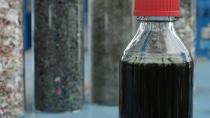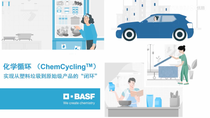Sustainability
ChemCycling®: Creating a circular plastics economy with chemical recycling

From plastic waste to virgin-grade products
Plastics do have proven benefits during their use phase – for example preservation of food loss in packaging applications, lightweight construction of vehicles, and building insulation. Plastic waste, however, has become a major global challenge. Globally, around 250 million metric tons of plastic waste are generated each year. Only around 20 percent of this plastic is recycled, thus keeping the material in circulation. Therefore, more plastic waste should be recycled overall. Solving this challenge and building a more circular economy for plastics requires innovation and joint efforts across the value chain. BASF will contribute to this by developing innovative technologies and products that promote the recycling of plastics.
A key pillar in this regard is ChemCycling®. Here, our partnerships focus on the chemical recycling using pyrolysis technology which turns plastic waste or end-of-life tires into a secondary raw material called pyrolysis oil. We feed the oil into BASF’s Verbund production at the beginning of the value chain, thereby saving fossil resources. By using a third-party audited mass balance approach, the share of recycled feedstock is attributed to products manufactured in the Verbund. These mass balanced Ccycled® products are independently certified and have the same properties as conventional products. Customers can therefore further process them in the same way and use them in demanding applications.
ChemCycling® focuses on plastic waste that is not recycled mechanically for technological, economic or ecological reasons. Examples are plastics with residues, mixed plastic waste fractions, consisting of different plastic types, which will not be sorted further or scrap tires which are not recycled otherwise. Together, mechanical and chemical recycling can increase the overall recycling rates and contribute to a more circular economy for plastics.
Video: Ready to scale up chemical recycling

Facts about ChemCycling®
Our Ccycled® product portfolio contributes to customer solutions for a circular economy
In ChemCycling®, BASF uses recycled feedstock derived from plastic waste for our broad Ccycled® product portfolio. The recycled feedstock is attributed to the certified Ccycled® products through a mass balance approach. BASF customers have successfully introduced Ccycled® products in various industries like (food) packaging, medical, textile and automotive.
We have established partnerships with Quantafuel, ARCUS, Pyrum and New Energy. Quantafuel and ARCUS are specialists for pyrolysis of mixed plastic waste, Pyrum and New Energy are specialized in the pyrolysis of end-of-life tires. With these partnerships, BASF has taken a significant step towards establishing a broad supply base for pyrolysis oil and towards offering customers certified products from chemical recycling on a commercial scale.
However, any new recycling process needs acceptance as recycling from market and regulators. There are still some open questions with regards to technology, economy and regulation. We closely engage with the relevant stakeholders to tackle these challenges.
The ChemCycling® circle
Video: Closing the loop with ChemCycling®

Facts about ChemCycling®
- Complementary: Chemical recycling can be used to process plastic waste streams that are not recycled mechanically for technological, economic or ecological reasons. For example, while sorted single-stream plastic waste should be recycled mechanically, chemical recycling can be used for mixed post-consumer plastic waste streams, consisting of, e.g., PE, PP, PS, for which further sorting is not economical.
- Solution oriented: Chemical recycling is an important addition to the recycling landscape. Redesigning plastic products to make them mechanically recyclable is not always feasible, for example, if this would lower performance or increase material consumption.
- Virgin-quality output: With chemical recycling, plastic waste streams can be converted back into feedstock for the chemical industry and allocated to products manufactured in BASF’s integrated chemical production network (Verbund) via a mass balance approach. These products have the exact same properties as those manufactured from fossil feedstock.
- Ease of use: Our customers can process these products in the same way as conventionally manufactured products and use them in applications with high demands on quality, hygiene and performance. These include, for example, medical applications, food packaging or safety-relevant automotive parts. This helps achieving higher recycled content targets for products which must meet highest quality standards.
- Certified transparently: Both the mass balance procedure, by which the proportion of recycled feedstock is allocated to the product, and the products themselves are certified by independent auditors.
- Resource and emission saving: By using recycled feedstock, we can save fossil resources. Additionally, products made with chemically recycled feedstock according to a mass balance approach release fewer greenhouse gases than conventional products from primary fossil resources. This is because the plastic waste is not incinerated but used to create new chemical products.
What is a Ccycled® product?
Conventional fossil raw materials required to manufacture BASF products are replaced with recycled feedstock from the chemical recycling of plastic waste or end-of-life tires along BASF’s integrated production chain. The corresponding share of recycled feedstock, e.g. pyrolysis oil, is attributed to the specific Ccycled® product via a certified mass balance approach. BASF sites and Ccycled® products are third-party certified according to internationally recognized certification schemes like REDcert2 and ISCC PLUS and meet the definitions by ISO 22095:2020. The recycled feedstock is not measurable in the BASF mass balance product. The cradle-to-gate PCF is calculated according to TfS Methodology using both a cut-off approach and an Upstream System Expansion (USE) approach. USE accounts for a credit for the displaced waste treatment from the first life cycle (e.g. incineration), thereby reducing the product carbon footprint compared to the equivalent conventional fossil product.














